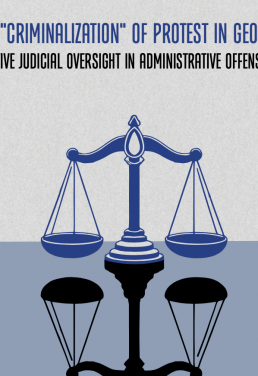საერთო ცხელი ხაზი +995 577 07 05 63


In recent years, amid sustained and large-scale protests, systematic violations of the fundamental rights to freedom of assembly and expression have become increasingly evident in Georgia. One of the principal tools employed in the state’s repressive strategy—pursued by the ruling party, "Georgian Dream"—is the Soviet-era Code of Administrative Offenses. Already misaligned with international human rights standards, this code has, through a series of recent legislative amendments, further evolved into a mechanism of mass repression.
The deterioration of conditions surrounding freedoms of assembly and expression has intensified, particularly in the context of ongoing public demonstrations and resistance that began on November 28, 2024. “Georgian Dream” has employed an array of coercive measures against peaceful demonstrators, including the use of disproportionate force, special police tactics, and both administrative and criminal sanctions. Several expedited amendments to the Code of Administrative Offenses during this period have criminalized protest activities and expanded unchecked police powers. Therefore, these changes pose a substantial threat to fundamental human rights and stand in direct contradiction to both the Constitution of Georgia and the core tenets of international law.
In addition to the anti-democratic legislative developments, the absence of effective judicial oversight has enabled the systematic penalization of protest participants and the continuous infringement of their rights. The persistence of public mobilization amid deepening socio-political crises has further exposed and accentuated the judiciary’s institutional shortcomings.
This document aims to critically assess the legal deficiencies associated with the most frequently invoked provisions in protest-related administrative offense cases. It also seeks to identify the prevailing and most problematic patterns in judicial practice regarding such cases.
The research has identified two principal issues: (1) the judiciary’s disregard for the inherent flaws of the Code of Administrative Offenses; and (2) the judiciary’s failure to exercise its mandate of independent oversight and control.
Methodology and Sources - This analysis is primarily based on administrative offense cases litigated by the Social Justice Center during 2023–2025. Specifically, the study examines the judgments rendered by both city and appellate courts, transcripts of relevant court hearings, and decisions issued by the Ministry of Internal Affairs concerning the legality of administrative detentions.
In addition to procedural documents and case law materials, the document evaluates legislative amendments affecting freedom of assembly and expression, action plans of the Parliamentary Legal Committee, rulings of international human rights courts, and pertinent reports issued by both local and international organizations.
The website accessibility instruction